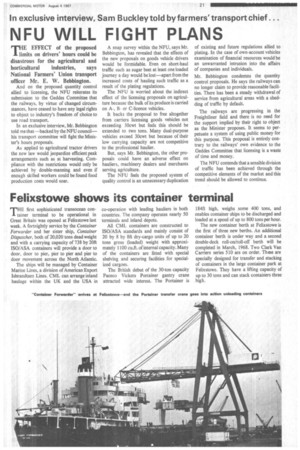NFU WILL FIGHT PLANS
Page 23

If you've noticed an error in this article please click here to report it so we can fix it.
'LiE EFFECT of the proposed mits on drivers' hours could be disastrous for the agricultural and horticultural industries, says National Farmers' Union transport officer Mr. E. W. Bebbington.
And on the proposed quantity control allied to licensing, the NFU reiterates its submission to the Geddes Committee that the railways, by virtue of changed circumstances, have ceased to have any legal rights to object to industry's freedom of choice to use road transport.
In an exclusive interview, Mr. Bebbington told me that—backed by the NFU council— his transport committee will fight the Minister's hours proposals.
As applied to agricultural tractor drivers the new law would jeopardize efficient peak arrangements such as at harvesting. Compliance with the restrictions would only be achieved by double-manning and even if enough skilled workers could be found food production costs would soar. A snap survey within the NFU, says Mr. Bebbington, has revealed that the effects of the new proposals on goods vehicle drivers would be formidable. Even on short-haul traffic such as sugar beet at least one loaded journey a day would be lost—apart from the increased costs of hauling such traffic as a result of the plating regulations.
The NFU is worried about the indirect effect of the licensing proposals on agriculture because the bulk of its produce is carried on A-, Bor C-licence vehicles.
It backs the proposal to free altogether from carriers licensing goods vehicles not exceeding 30cwt but feels this should be extended to two tons. Many dual-purpose vehicles exceed 30cwt but because of their low carrying capacity are not competitive to the professional haulier.
But, says Mr. Bebbington, the other proposals could have an adverse effect on hauliers, machinery dealers and merchants serving agriculture.
The NFU feels the proposed system of quality control is an unnecessary duplication of existing and future regulations allied to plating. In the case of own-account vehicles examination of financial resources would be an unwarranted intrusion into the affairs of companies and individuals.
Mr. Bebbington condemns the quantity control proposals. He says the railways can no longer claim to provide reasonable facilities. There has been a steady withdrawal of service from agricultural areas with a shedding of traffic by default.
The railways are progressing in the Freightliner field and there is no need for the support implied by their right to object as the Minister proposes. It seems to perpetuate a system of using public money for this purpose. This proposal is entirely contrary to the railways' own evidence to the Geddes Committee that licensing is a waste of time and money.
The NFU contends that a sensible division of traffic has been achieved through the competitive elements of the market and this trend should be allowed to continue.












































































































